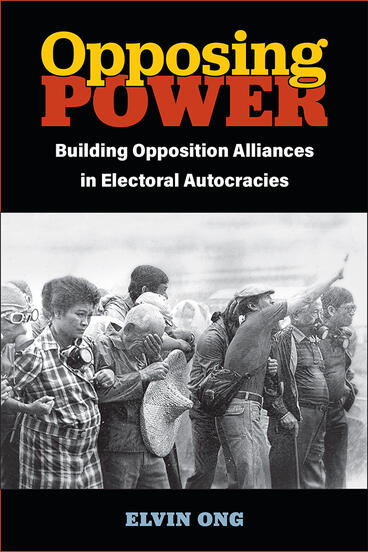Opposing Power
Building Opposition Alliances in Electoral Autocracies
Why Opposition Parties Use Alliances to Fight Autocracy, and When They Don't
Description
Opposing Power argues that perceptions of regime vulnerability and mutual dependency by opposition elites shape the building of opposition alliances. When electoral autocracies are consistently dominant, opposition parties eschew fully fledged alliances. At best, they allocate only one candidate to contest against the incumbent in each subnational electoral district to avoid splitting the opposition vote. However, when multiple regime-debilitating events strike within a short period of time, thus pushing an incumbent to the precipice of power, opposition elites expect victory, accepting costly compromises to build alliances and seize power. Opposing Power shows how oppositions build these alliances through case study comparisons in East and Southeast Asia—between the Philippines and South Korea in the late 1980s, and between Malaysia and Singapore from 1965 to 2020.
Elvin Ong is Assistant Professor of Political Science at the National University of Singapore.
Reviews
“Elvin Ong has written an important book that puts opposition activists at the center of the analysis. The book is motivated by a simple yet powerful observation that pre-election opposition alliance building is critical in determining democratic outcomes. But rather than simply assume that opposition parties represent ‘stackable’ votes against the incumbent regime, Ong highlights the numerous challenges—structural, perceptual, and strategic—that can often undermine the opposition. Ong offers a theory about when and how opposition parties are able to coordinate and ultimately defeat authoritarian rulers, and draws on a careful and empirically rich analysis of four critical Asian cases to substantiate his argument. This book not only forwards important theoretical insights for the democratization literature but also actionable lessons on how to embolden and empower democratic champions.”
—Joseph Wong, Professor, Political Science and Munk School of Global Affairs and Public Policy, University of Toronto
- Joseph Wong
“This is an extremely original study that explains why opposition parties do or do not join together against autocratic governments. With a wealth of empirical evidence, judicious selection of cases, and intensive process-tracing, Elvin Ong demonstrates convincingly that parties’ perceptions of regime vulnerability and of their mutual dependence shape pre-electoral alliances. The book’s distinct contribution lies especially in its ability to trace and theorize the dynamics through which perceptions emerge and affect opposition coalitions. In doing so, Ong has built a unique theoretical model, while at the same time advancing significant insight of political development in Asia.”
—Erik Martinez Kuhonta, McGill University, author of The Institutional Imperative
- Erik Martinez Kuhonta
“Autocrats are hard to defeat in multi-party elections. It helps if opposition parties coordinate, but this is a difficult task. In this fascinating book, Elvin Ong details why, how, and when opposition parties build by pre-electoral alliances. Providing theoretical insights and in-depth studies of four East Asian countries, Ong’s book makes important contributions to the study of opposition politics in autocracies and regime change.”
—Carl Henrik Knutsen, University of Oslo
- Carl Henrik Knutsen
"Many scholars study authoritarianism. A growing number look at electoral coordination. Elvin Ong’s important and meticulously researched book smartly combines and contributes to both areas of scholarly research. His richly detailed analysis of understudied cases in Asia shows us when opposition parties successfully coordinate to undermine electoral autocrats."
—Adam Ziegfeld, Temple University
- Adam Ziegfeld
"Opposition parties in authoritarian regimes remain poorly understood, yet they are key players in the process of democratization. Focusing on the strategic calculation of opposition party coordination, Ong provides an extraordinary contribution to the comparative democratization literature. Anyone interested in authoritarian elections anywhere will find this book hugely relevant.”
—Michael Wahman, Michigan State University
- Michael Wahman
"Opposing Power: Building Opposition Alliances in Electoral Autocracies is a welcome addition to the scholarship on hybrid regimes, political parties, and democracy, with its in-depth examination of East and Southeast Asian cases. It addresses theoretically and empirically important questions about the possibility of opposition unity and its electoral rise under electoral autocracies and its findings contribute to our renewed understanding of the durability and vulnerability of authoritarian incumbents. It also enriches our knowledge on party politics and democratization in Asia, which remains quite thin compared to that in other regions."
- Yoonkyung Lee
—Pacific Affairs

